Recent News
Siblings share a passion for animalsFriday, July 26, 2013
A passion for animals led siblings Peter and Kate Cooper to become volunteers with the Bermuda Zoological Society.
Baby 'pygmy' sperm whale found dead
Wednesday, July 24, 2013
What is believed to be a baby pygmy sperm whale was found washed up dead in the shallows off Nonsuch Island.
Kids on the Reef returns for a third year
Thursday, July 18, 2013
Dr Sterrer to give a lecture on Island’s biodiversity
Thursday, July 11, 2013
A local natural history expert will explore some of the miraculous ways that Bermuda’s plants and animals found their way to the Island, tomorrow evening at the Bermuda Underwater Exploration Institute (BUEI).
Kids on the Reef returns for a third year
Monday, July 08, 2013
On the way out to North Rock the young people in the boat started to wonder why they had come. Despite having lived on an Island their whole lives, most of them had never been out of sight of land. They were nervous and spent the ride worrying about currents, sharks, the weather, and the depth of the ocean.
About
GovernanceAbout Us
Newsletter
Latest News
Gift & Bookstore
Contact
General Inquiries
info@bzs.bm
Latest News
All the latest updates and news from the Bermuda Aquarium, Museum, and Zoo, one of Bermuda's leading visitor attractions!
Jonathan Bell
Published Jan 16, 2018 at 8:00 am (Updated Jan 16, 2018 at 6:41 am)

HSBC volunteers help a Bermuda Zoological society team clean up
Cloverdale Pond in Smith's (Photograph supplied)
Two ponds have been cleaned up courtesy of an island conservation programme.
Cloverdale Pond in Smith’s and Southampton’s Evan’s Pond, a refuge for endangered species, were improved through the Bermuda Zoological Society’s wetlands remediation programme.
The scheme, which became the HSBC global water programme for Bermuda in 2014, was designed to remove toxic petroleum compounds from ponds.
The build-up of the poisonous hydrocarbons is a threat to the island’s two endemic killifish species, as well as native diamondback terrapins, which are a protected species.
The compounds, which come from oil, water runoff and vehicle exhausts, can be broken down by bacteria when the pond sediments are aerated.
The two-year grant from HSBC allowed the proposal to be tested in the field.
Volunteers also took part, with help from the Department of Environment and Natural Resources.
The BZS said Cloverdale was chosen first because of its small size, its “known severe effects on wildlife” and the absence of protected species in the water.
Evan’s Pond was selected as the second test site because of its small population of killifish.
The ponds were divided into sections and aerated for six to eight hours a day with solar powered compressors.
Hydrocarbon levels saw a major reduction over the course of a year.
The next site for remediation is the South Pond at the Mid Ocean golf course, where the hatching of diamondback terrapins has been hampered by pollution.


